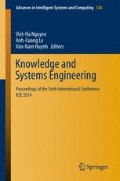Abstract
Question classification is a first necessary task of automatic question answering systems. Linguistic features play an important role in developing an accurate question classifier. This paper proposes to use typed dependencies which are extracted automatically from dependency parses of questions to improve accuracy of classification. Experiment results show that with only surface typed dependencies, one can improve the accuracy of a discriminative question classifier by over 8.0% on two benchmark datasets.
Access this chapter
Tax calculation will be finalised at checkout
Purchases are for personal use only
Preview
Unable to display preview. Download preview PDF.
References
Li, X., Roth, D.: Learning question classifiers: the role of semantic information. Natural Language Engineering 12(3), 229–249 (2006)
Huang, Z., Thint, M., Qin, Z.: Question classification using head words and their hypernyms. In: Proceedings of the 2008 Conference on EMNLP, pp. 927–936 (2008)
Li, X., Roth, D.: Learning question classifiers. In: Proceedings of COLING, pp. 556–569 (2002)
Zhang, D., Lee, W.S.: Question classification using support vector machines. In: Proceedings of the 26th ACM SIGIR, pp. 26–32 (2003)
Hacioglu, K., Ward, W.: Question classification with support vector machines and error correcting codes. In: Proceedings of NAACL/HLT, pp. 28–30 (2003)
Krishnan, V., Das, S., Chakrabarti, S.: Enhanced answer type inference from questions using sequential models. In: Proceedings of EMNLP, pp. 315–322 (2005)
Minh, N.L., Thanh, N.T., Akira, S.: Subtree mining for question classification problem. In: Proceedings of IJCAI, pp. 1695–1700 (2007)
Ng, A.Y., Jordan, M.I.: On discriminative vs. generative classifiers: A comparison of logistic regression and naive Bayes. In: Advances in NIPS (2001)
Andrew, G., Gao, J.: Scalable training of l 1-regularized log-linear models. In: ICML, pp. 33–40 (2007)
Kübler, S., McDonald, R., Nivre, J.: Dependency Parsing. Morgan & Claypool Publishers (2009)
Candito, M., Crabbé, B.: Improve generative statistical parsing with semi-supervised word clustering. In: Proceedings of the Eleventh International Conference on Parsing Technologies (IWPT) (2009)
Liang, P., Jordan, M.I., Klein, D.: Learning dependency-based compositional semantics. Computational Linguistics 39(2), 389–446 (2012)
de Marneffe, M.-C., MacCartney, B., Manning, C.D.: Generating typed dependency parses from phrase structure parses. In: Proceedings of LREC 2006, Italy, (2006)
Voorhees, E.M.: Overview of TREC 2001 question answering track. In: Proceedings of The Tenth Text REtrieval Conference. NIST (2001)
Thanh, N.T., Minh, N.L., Akira, S.: Using semi-supervised learning for question classification. Journal of Natural Language Processing 3(1), 112–130 (2008)
Klein, D., Manning, C.D.: Accurate unlexicalized parsing. In: Proceedings of ACL, Sapporo, Japan, pp. 423–430 (July 2003)
Le-Hong, P., Nguyen, T.M.H., Azim, R.: Vietnamese parsing with an automatically extracted tree-adjoining grammar. In: Proceedings of the IEEE RIVF, HCMC, Vietnam (2012)
Hông Phuong, L.ê., Thi Minh Huyên, N., Roussanaly, A., Vinh, H.T.: A hybrid approach to word segmentation of Vietnamese texts. In: Martín-Vide, C., Otto, F., Fernau, H. (eds.) LATA 2008. LNCS, vol. 5196, pp. 240–249. Springer, Heidelberg (2008)
Tran, D.H., Chu, C.X., Pham, S.B., Nguyen, M.L.: Learning based approaches for Vietnamese question classification using keywords extraction from the web. In: Proceedings of the IJCNLP, Nagoya, Japan, pp. 740–746 (2013)
Author information
Authors and Affiliations
Corresponding author
Editor information
Editors and Affiliations
Rights and permissions
Copyright information
© 2015 Springer International Publishing Switzerland
About this paper
Cite this paper
Le-Hong, P., Phan, XH., Nguyen, TD. (2015). Using Dependency Analysis to Improve Question Classification. In: Nguyen, VH., Le, AC., Huynh, VN. (eds) Knowledge and Systems Engineering. Advances in Intelligent Systems and Computing, vol 326. Springer, Cham. https://doi.org/10.1007/978-3-319-11680-8_52
Download citation
DOI: https://doi.org/10.1007/978-3-319-11680-8_52
Publisher Name: Springer, Cham
Print ISBN: 978-3-319-11679-2
Online ISBN: 978-3-319-11680-8
eBook Packages: EngineeringEngineering (R0)

